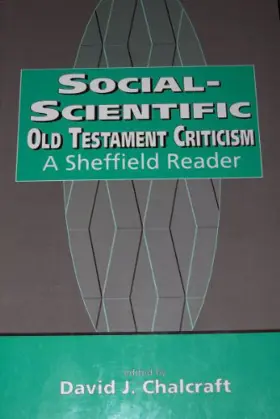

Social Scientific Old Testament Criticism: A Sheffield Reader (Biblical Seminar Series ; Volume 47))
Pages
395
Publisher
Sheffield Academic Press
Published
11/1/1997
ISBN-13
9781850758136
This useful reader assembles eighteen essays from the prestigious Journal for the Study of the Old Testament which illustrate a variety of approaches to the Old Testament falling in some way into the category of 'social-scientific criticism' as it has been conceived by biblical scholars over the past twenty years. Divided into six sections, this volume presents essays on the central methodological and theoretical issues as well as a series of applications to the study of early Israelite social forms, the formal and informal regulation of life, the distribution of power and justice, the performance of social roles and the process of group formation. The volume brings home how indispensable a social-science approach is for the reconstruction of the Israelite social world - not to say our own worlds and productions as well, hence keeping alive the finest traditions of classical social theory and the interface with exciting new developments.
Reviews
A colllection of studies on the subject that have been published in the Journal for the Study of the Old Testament.
[Full Review]
Social-Scientific Old Testament Criticism: A Sheffield Reader The Biblical Seminar 47 Sheffield: Sheffield Academic Press, 1997. Pp. 395, Paperback, £14.95/$19.95, ISBN 1850758131. Gary N. Knoppers The Pennsylvania State University University Park, PA 16802-5500 This work is a collection of eighteen essays, all of which have been previously published in JSOT. Divided into six parts, the book begins with an introduction by the editor. The first section entitled “Theory and Methodology” contains: “On Applying a Sociological Theory to Biblical Studies,” by Cyril S. Rodd (pp. 22-33);=JSOT 19 (1981) 95-106; “Sociological and Literary Approaches to the Bible: How Shall the Twain Meet?” by David Jobling (pp. 34-42);=JSOT 38 (1987) 85-93; “Using the Nuer Culture of Africa in Understanding the Old Testament: An Evaluation,” by David Fiensy (pp. 43-52);=JSOT 38 (1987) 73-83; “The ‘Popular Religion’ Paradigm in Old Testament Research,” by J. Berlinerblau (pp. 53-76);=JSOT 60 (1993) 3-26. The second section, “Sociology of Knowledge,” contains: “The Impact of Modem and Social Science Assumptions on the Reconstruction of Israelite History,” by Gary A. Herion (pp. 78-108);=JSOT 34 (1986) 3-33; “Literacy and Domination: G. A. Herion’s Sociology of History Writing,” by Mark G. Brett (pp. 109-34);=JSOT 37 (1987) 15-40. The third section, “Early Israel in Sociological and Anthropological Perspective,” contains: “Chiefs in Israel,” by James W. Flanagan (pp. 136-61);=JSOT 20 (1981) 47-73; “Was Early Israel a Segmentary Society?” by J. W. Rogerson (pp. 162-71);=JSOT 36 (1986) 17-26; “The Identity of Early Israel: The Realignment and Transformation of Late Bronze-Iron Age Palestine,” by Keith W. Whitelam (pp. 172-203);=JSOT 44 (1989) 19-42. The fourth section, “The Regulation of Social Life: Law, Ethics and Deviance,” contains: “Customary Law and Chieftainship: Judicial Aspects of 2 Samuel 14.4-21” by Elizabeth Bellefontaine (pp. 206-31);=JSOT 38 (1987) 47-72; “Shame as Sanction of Social Control in Biblical Israel: Judicial, Political, and Social Shaming,” by Lyn M. Bechtel (pp.
[Full Review]

